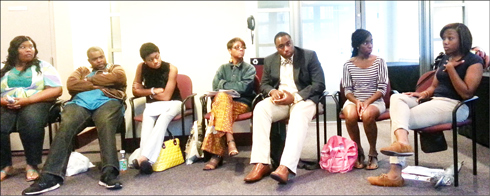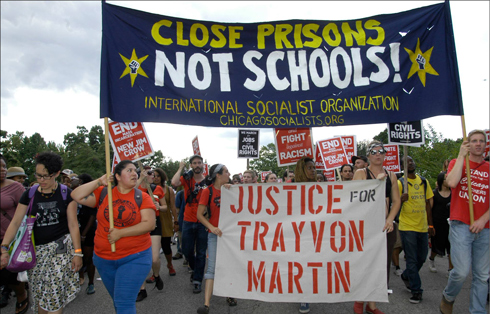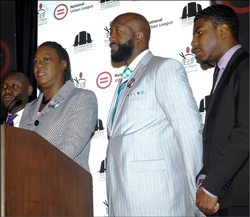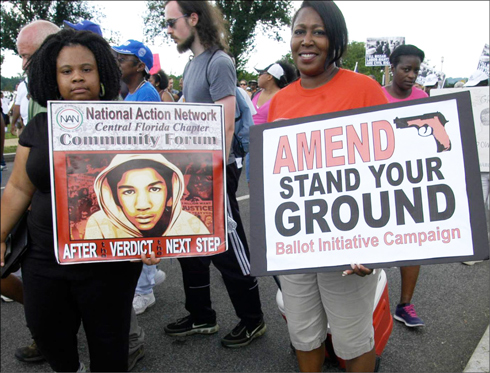'It's like we knew racism existed but we forgot'
By Aqueelah Muhammad -Contributing Writer- | Last updated: Aug 28, 2013 - 12:24:59 PMWhat's your opinion on this article?

Youth participate in a ‘Stand your ground law’ panel discussion. Photo: Aqueelah Muhammad
|

From better education to justice for Trayvon Martin, Marchers turned out. Photo: Richard B. Muhammad
|
WASHINGTON (FinalCall.com) - The 50th anniversary for the March on Washington inspired many groups to come together and discuss what has changed since the historic 1963 march and how much more work needs to be done to change the plight of Black America.
In northwest D.C., the National Coalition on Black Civic Participation, NAACP and other groups hosted a civic and Black youth leadership conference. There were several workshops Aug. 23 where participants discussed varied topics and issues impacting young people and what can be done to improve American society.

Sybrina Fulton spoke powerfully about the work of the Trayvon Martin Foundation, named for her slain son at the Redeem the Dream Summit in Washington, DC. Her efforts and those of Trayvon’s father, Tracy Martin, are devoted to keeping others from feeling the pain of such loss. The foundation support families who lose children and is pushing for ending Stand Your Ground laws. Photo: Richard B. Muhammad
|
Dr. Ray lead a roundtable discussion by explaining state Stand Your Ground Laws and policies like Stop and Frisk that encourage racial profiling and threaten Black and Latino youth.
Though Stand Your Ground wasn’t expressly used as a defense in the Florida trial of the killer of unarmed Black youth Trayvon Martin, the jury was instructed that “if George Zimmerman was not engaged in an unlawful activity and was attacked in any place where he had a right to be, he had no duty to retreat and had the right to stand his ground and meet force with force, including deadly force if he reasonably believed that it was necessary to do so to prevent death or great bodily harm to himself or another or to prevent the commission of a forcible felony.”
Mr. Zimmerman was found not guilty though he pursued the teenager—who was on the way back home after visiting a convenience store for candy and a drink—after a 911 dispatcher instructed the neighborhood watch volunteer not to.
The Stop and Frisk Law policy in New York, which was recently struck down in a legal decision, says based on “reasonable suspicion” a police officer can question and then pat down a person checking for drugs or weapons. In 2012, 532,911 New Yorkers were stopped. Of those stopped, 55 percent were Black, 32 percent were Latino, 10 percent were White and 89 percent of those stopped were not found engaged in anything illegal. This tactic has been disproportionately used to target Black and Latino men, infringing on their Fourth Amendment rights and their dignity, said opponents of the police activity.
So what makes us look so suspicious? the facilitator asked the room. “Who in this room has actually been stopped using Stop and Frisk?” he asked. Out of 3 males in the room two raised their hands, and the facilitator mentioned that he had been stopped twice. Then participants started sharing individual stories of how racism and targeting has affected them.

Marchers representing a variety of views were present. Photo: Richard B. Muhammad
|
Perhaps the most striking story came from a 15-year-old student who shared an experience with a “racist” teacher. The teacher got into a verbal confrontation with another student over trash on the floor. “Well this is what you get when you babysit crackheads who eat collard greens and fried chicken,” the teacher told the class. The student went on to express her feelings about the Zimmerman trial. “What is your thought process that you want to remove someone because of their skin color? It’s a disease,” she said.
“It’s like we knew racism existed, we just forgot,” said Mary Pat Hector, age 15. She felt most youth in her generation had not experienced racism in this way until now and the Zimmerman trial’s “not guilty” outcome shocked her.
“We’re coping with mistreatment instead of realizing this shouldn’t be accepted and doing something to change this situation,” said another workshop participant.
“Racism would not be a problem if it were individuals who just didn’t like us. It’s a problem because racism is institutionalized. These people are in power and are taking away our rights,” said a teacher during the session.
Dr. Ray asked the group, “How do you account for the injustice in our justice system?” They’ve criminalized what we do as a people. How fast or how slow do we have to walk?” responded one workshop participant.
INSIDE STORIES AND REVIEWS
-
-
About Harriett ... and the Negro Hollywood Road Show
By Rabiah Muhammad, Guest Columnist » Full Story -
Skepticism greets Jay-Z, NFL talk of inspiring change
By Bryan 18X Crawford and Richard B. Muhammad The Final Call Newspaper @TheFinalCall » Full Story -
The painful problem of Black girls and suicide
By Charlene Muhammad -National Correspondent- » Full Story -
Exploitation of Innocence - Report: Perceptions, policies hurting Black girls
By Charlene Muhammad -National Correspondent- » Full Story -
Big Ballin: Big ideas fuel a father’s Big Baller Brand and brash business sense
By Bryan Crawford -Contributing Writer- » Full Story






 Click Here Stay Connected!
Click Here Stay Connected!








